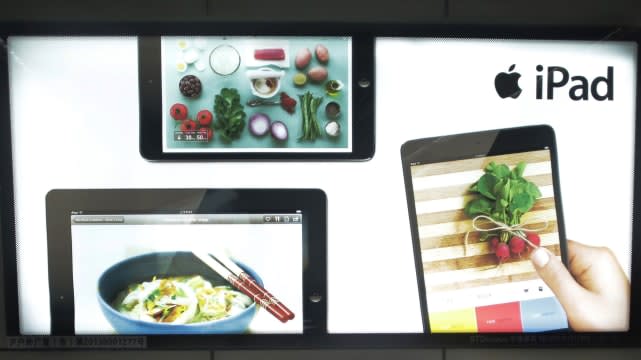Some needed context surrounding Apple's iPad sales decline

Apple during the quarter gone by posted stellar earnings, with revenue that topped some analyst estimates by a whopping $2 billion. Naturally, extremely strong iPhone sales accounted for the bulk of Apple's quarterly profit while iPad sales were much weaker than analysts were anticipating.
All told, Apple sold 16.35 million iPads during the quarter, representing about a 16% decline in sales from the same quarter a year-ago.
So what gives? Are the iPad's best days behind it? Did Apple's famed tablet, as some have written, struggle with unrealistic expectations?
Maybe. Maybe not. Truth be told, there are not yet enough data points to make any sweeping generalizations about the iPad's vitality.
Of course, that didn't stop the pundit brigade from trotting out headlines like, "Apple struggling with iPad sales" and "Apple sales numbers show iPad fever is officially cooling."
Per usual, the reality is much more nuanced.
For what it's worth, Tim Cook addressed the drop in iPad sales during the company's recent earnings conference call.
iPad sales came in at the high end of our expectations, but we realized they were below analysts' estimates and I would like to proactively address why we think there was a difference. We believe almost all of the difference can be explained by two factors. First, in the March quarter last year we significantly increased iPad channel inventory, while this year we significantly reduced it... Second, we ended the December quarter last year with a substantial backlog of iPad mini that was subsequently shipped in the March quarter whereas we ended the December quarter this year near supply demand balance.
Indeed, it's important to consider context when looking at sales figures. So with respect to the aforementioned backlog, recall that pre-orders of the original iPad Mini sold out in just two days during the fall of 2012. Over and above that, shipping times for those that even got their orders in came in at two weeks. In other words, the iPad Mini backlog Tim Cook is referring to was very real and thus led to a spike in iPad sales during the company's first quarter of 2013.
Consequently, and as the chart below demonstrates, the drop-off in iPad sales may have more to do with an unseasonably strong Q1 2013 than a particularly disappointing Q1 2014. Typically, iPad sales drop off precipitously after the always busy holiday shopping season. Last year, however, that wasn't the case during the March quarter.

Put differently, the distribution of iPad sales across Q4 and Q1 may have simply returned to normalized levels this year. Which is to say that all of the hoopla surrounding a defeated iPad is misguided, to say the least.
As for Tim Cook hinting at some inventory logistics, this was expanded on later during the conference call.
Turning to iPad, we sold 16.4 million units. As Tim explained earlier, our iPad results and the comparison to the March quarter last year were heavily influenced by channel inventory changes. Specifically, this year we sold 16.4 million iPad into our channel and sold through almost 17.5 million, reducing our channel inventory by 1.1 million units.
Last year, we sold over 19.4 million iPads into our channels and sold through 18 million, and therefore increased channel inventory by 1.4 million units. As a result, the year-over-year sell through decline was only 3% compared to the sell-in decline of 16%.
All this being said, it's far too soon to speculate as to the health of the iPad. While it's easy for analysts and pundits to sit back and make bold proclamations about the iPad having peaked, one has to take a broad view of the market to truly make any insightful deductions.
And truthfully, there are too many variables to consider to know either way how the iPad will fare going forward. Perhaps the iPad Air's feature set wasn't sufficiently appealing enough to warrant extended sales momentum. Perhaps boatloads of consumers are waiting for an iPad with Touch ID before upgrading. Perhaps the upgrade cycles on tablets are more drawn out than they are for smartphones. Or maybe, just maybe, the iPad sales decline this quarter can really be attributed to an especially high sales quarter last year and the aforementioned inventory gymnastics Apple executives highlighted.
Lastly, MG Siegler pointed out last week that if the iPad functioned as a standalone business, it would warrant inclusion in the Fortune 100.
In other words, let's keep things in perspective.

